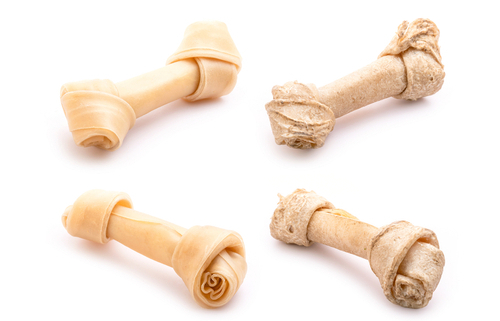Rawhide: Good or Bad for Your Pups?
Rawhide treats….we know that you’ve heard of them! They are a very popular treat for dogs. A natural instinct for dogs is to chew. But are there any drawbacks to giving your dog rawhide treats. Maybe there are some alternatives to think about as well? Here’s what we think you need to know!
- What are they made of? A lot of people don’t realize this, but rawhide treats come from the inner layer of cow or horse hides. The rawhides go through a manufacturing process where they are cleaned and cut (or ground). Then they are pressed into chewable dog treats.
- The benefits! ALL DOGS need to chew! It’s their natural instinct to do so. Chewing can provide your dog with brain stimulation and even help relieve stress and anxiety. Look at it this way…a rawhide treat is a much better alternative to a leather couch cushion or tennis shoe!
- What are the risks? The risks of dogs consuming rawhide are relatively small. However, risks can be serious so be sure to pay close attention! Below are some common risks of rawhide consumption in dogs:
- Digestive issues. Some dogs may be sensitive or allergic to rawhide depending on substances used during manufacturing. This can cause diarrhea and stomach pain.
- Rawhide treats can contain trace amounts of toxic chemicals. This is the same for pet toys. Salmonella or E. coli contamination is possible. Even humans can be at risk when coming into contact with this type of bacteria.
- Choking hazards. This is actually a much bigger risk compared to digestive issues or contamination! If your dog swallows larger pieces of rawhide, it is possible for it to get stuck in the esophagus or other parts of the digestive tract. Depending on the size of the rawhide treat and is location, a Veterinarian may be able to remove pieces through the throat. However, if it’s a bad case, abdominal surgery may be needed to remove the rawhide from the intestines.
- Precautions. There are precautions to make rawhide treats safer for your dog. You should ask your Veterinarian about how much is safe to give your dog. Be sure to separate your dog from other pets so that they can chew in peace. Otherwise, they will be rushed to chew the treat which may cause it to get stuck.
- What are the signs? Pay close attention to the signs of bacterial contamination, blockage or gastric irritation. Contact your Veterinarian immediately if your dog has signs such as:
- repeated swallowing
- vomiting
- diarrhea
- fever
- signs of pain
- lethargy
- refusal to eat or weight loss
Always remember that there are other options other than rawhide chews. Dog owners can try a variety of chewing treats or toys to find out which works best!



